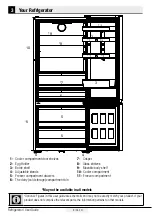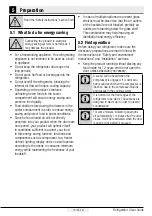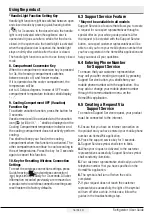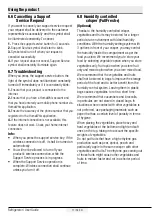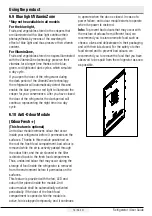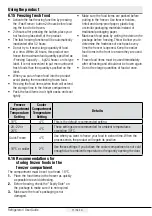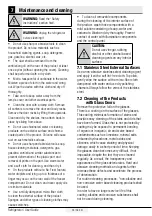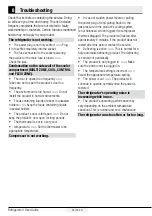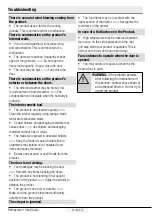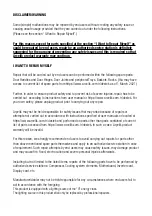
23 / 28 EN
Refrigerator / User Guide
7
Maintenance and cleaning
B
WARNING:
Read the “Safety
Instructions” section first!
.
B
WARNING:
Unplug the refrigerator
before
cleaning it.
t
Do not use sharp or abrasive tools to clean
the product. Do not use materials such as
household cleaning agents, soap, detergents,
gas, gasoline, alcohol, wax, etc.
t
The dust shall be removed from the
ventilation grill on the rear of the product at least
once a year (without opening the cover). Cleaning
shall be performed with a dry cloth.
t
Melt a teaspoonful of carbonate in the water.
Moisten a piece of cloth in the water and wring
out. Wipe the device with this cloth and dry off
thoroughly.
t
Take care to keep water away from the
lamp's cover and other electrical parts.
t
Clean the door with a damp cloth. Remove
all contents to remove the door and body racks.
Remove the door racks by lifting them upwards.
Clean and dry the shelves, then attach back in
place by sliding from above.
t
Do not use chlorinated water or cleaning
products on the exterior surface and chrome-
coated parts of the product. Chlorine will cause
rust on such metallic surfaces.
t
Do not use sharp and abrasive tools, soap,
house cleaning materials, detergents, gas,
gasoline, varnish and similar substances to
prevent deformation of the plastic part and
removal of prints on the part. Use warm water
and a soft cloth for cleaning, and then dry it.
t
On the products without a No-Frost feature,
water droplets and icing up to a thickness of a
finger may occur on the rear wall of the freezer
compartment. Do not clean, and never apply oils
or similar materials.
t
Use a mildly dampened micro-fiber cloth
to clean the external surface of the product.
Sponges and other types of cleaning clothes may
cause scratches.
t
To clean all
removable components
during the cleaning of the interior surface of
the product, wash these components with a
mild solution consisting of soap, water and
carbonate. Wash and dry thoroughly. Prevent
contact of water with illumination components
and the control panel.
A
CAUTION:
Do not use vinegar, rubbing
alcohol or other alcohol based
cleaning agents on any interior
surface.
7.1 Stainless Steel External Surfaces
Use a non-abrasive stainless steel cleaning agent
and apply it with a soft lint-free cloth. To polish,
gently wipe the surface with a micro-fiber cloth
dampened with water and use dry polishing
chamois. Always follow the veins of the stainless
steel.
7.2 Cleaning of the Products
with Glass Doors
Remove the protective foil on the glasses.
There is a coating on the surface of the glasses.
This coating minimizes formation of stains and
provides easy cleaning of the stains and dirts that
have been formed. Glass that is not protected by
coating may be exposed to permanent bonding
of organic or inorganic, air and water-based
contaminants such as limestone, mineral salts,
unburned hydrocarbons, metal oxides and
silicones, which cause staining and physical
damage easily in a short period of time. Keeping
the glasses clean becomes very difficult, if not
impossible, despite the fact they are cleaned
regularly. As a result, the transparency and
appearance of the glass deteriorates. Hard and
abrasive cleaning methods and agents further
increase these defects and accelerate the process
of deterioration.
For routine cleaning processes, *non-alkaline and
non-corrosive water based cleaning products shall
be used.
In order to have a longer service life of this
coating, alkaline and corrosive substances shall
not be used during cleaning.

